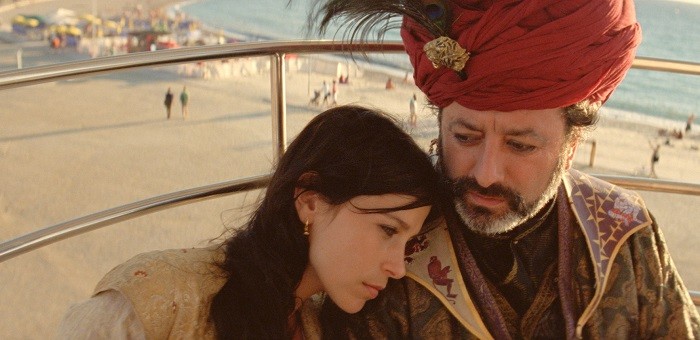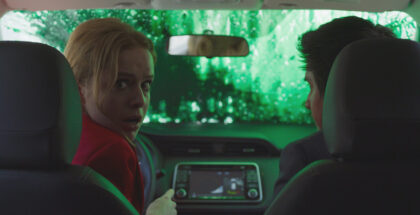Interview: Miguel Gomes talks Arabian Nights
Nathanael Smith | On 27, Apr 2016
The Arabian Nights trilogy is not a naturally easy series of films to watch. Over three films, spanning roughly six hours, director Miguel Gomes spins a number of different yarns in the style of Scheherazade to comment on the state of Portugal today. At times it’s very oblique, while metatextual framing devices and complex political issues can make it a taxing watch. Talking to Gomes himself, however, brings the films to life as he passionately engages with the themes of his critically acclaimed triptych.
What was the inspiration behind adapting a Middle Eastern set of stories to comment on modern day Portugal?
Well, it was the idea that I should show things about what was happening in my country, the social and economic crises. But I also like to tell stories, not only show things but also tell stories. For me, Arabian Nights is like the Bible of storytelling. So, it’s a very particular kind of storytelling. Arabian Nights is pretty wild and what was happening in Portuguese society was also very extreme. The real stories that people were living, the situations they were facing, were also very extreme. And so both things came together and I thought I would need the help of Queen Scheherazade to help me to tell the stories about my country.
This is a film laden with political commentary. Did the message or the story come first in your development of the film?
In the film, I think you have very different stories and these stories, sometimes, what you can take from them, sometimes they have opposite effects. I like that, because I don’t think there is only one way to look at Portuguese society. I don’t have the “right” way to look at it; I don’t know if that exists. I think there are lots of ways of looking at it. So, for me, it was very important to have more than one way of looking at things; this is why it’s so big, because I needed many stories not to say the same thing, but to say different things.
This contrasts with something we were listening to all the time when we were making the film. The Prime Minister of Portugal at that moment, and the government and the technicians of the troika, they were always telling us. “You have to do this, you have implement these measures, there is no other way to do this.” For me, it was very important to have different stories with many different approaches of cinema, storytelling and the way you look at things.
Richard Brody in the New Yorker claims that you have reinvented political cinema through these films. Was that an intention at the outset? Do you think there are enough voices reflecting modern Europe?
Well let’s say I’m flattered, but I’m not responsible for what film critics write. It was a long time ago when I was also a film critic, then I was responsible for my reviews. So I don’t think I agree that I’m reinventing cinema, I’m just using the tools we have today.
The cinema that I started to love from childhood, for instance, The Wizard of Oz, makes a very artificial world that cinema could invent that was telling us things about our life but didn’t look, at all, like life. It looked more like a dream or something. It was never intended for a viewer to watch the film and to have the idea that he was living another life. It’s real life, but another world. I cannot say no to the possibility of showing things that are taking place now, in our world and I cannot also renounce the possibility of creating these worlds that are maybe closer to dreams than to real life.
Over the course of three films, you’ll have one story with scatological humour about men with sustained erections and then another deeply moving story of unemployed people recounting their tales. It veers between surreal to coarse to emotive. How did you negotiate between these tones?
It’s like we do in every situation. We just have to start somewhere and then you keep moving, then you have the impression that you’re done with that kind of tone or mood, so you move to a different thing. One of the things I loved was the transition, to establish the rules of our world, the tone of the film and then to change it to another thing. As I was saying to you before, I don’t want cinema that looks like real life, but a cinema that looks like cinema, which is something else. But it shares something with real life, which is that every day we go from one mood to another. We go from being happy to melancholia. This happens all the time so I wanted the film to grab all these kind of different moods because for me, it’s important to have them all and I derive much pleasure going from one film to another. It’s a very important part of making a film, shifting from one tone to another; if you are always playing the same note, it’s a little bit boring.
The film it reminded me of most was Centro Historico, by four different directors, again veering between different ideas and tones but with different directors behind each vignette. Did you consciously take on different directorial styles to tell each story? Like did you adopt a western mindset to tell the story of the fleeing murderer? Did the story dictate the form?
I think every time it’s different. The result of each episode is also the result of how we did it. I mean, in the second film, there was a story that was completely written. If the actress were not saying the dialogue, I would say cut. It was the story of the judge, which was almost like a theatre piece in its screenplay. Then there are others that are much more loose, in the sense that we were improvising on set.
The result is when the script is more established, like with the judge story, things are much more planned. We have lots of extras, so we pay attention to how we structure it, how we do the mise-en-scene, how we would shoot this episode. Then there were others where I would really discover what I’m going to do, what’s going to happen in the film, during the process of shooting it. This will lead to very different kinds of things.
For me, the film is a little like Noah’s Ark, where he puts every kind of animals in the ark. They’re all animals, but they’re very, very different. You can put them in a capsule and you can see how they will react to time. In the film, they are very different kind of animals, I put them inside this ark, this film, but they are all very different. But they share something. They are Portuguese animals, they are Portuguese stories. They are about a precise moment in time. When you leave, when you make the film, they will be in this ark for all time to come.
It’s the same with Arabian Nights, the book, it’s a collection of Arabian folk tales that are collected and put in a book and like, 2,500 years after they were told, they are collected in a book and we can read them. They are very, very different, every tale of Arabian Nights.
It opens with metatextual commentary as you film yourself being anxious about the kind of film you wish to make. Why was this important for you to keep in the film? The stories then get doubly framed, first within the tales of Scheherazade, the within the story of you making your own film. Were you worried that this would distance audiences from the immediacy of the tales?
I don’t know, I have the sensation that the film is much more about the stories than the people telling the stories. The bit where I appear as the film director, then pass the ball to Scheherazade, then she almost renounces her duty to tell stories, this appears in the film because we’re dealing with crises, any kind of crisis, and this is maybe a crisis of storytelling and how it is difficult to tell our world from these great stories from our past. How can we continue with these mythological narratives and at the same time pay attention to our daily lives and things connected to our time? You have these moments with the film director in crisis, and Scheherazade in crisis, but they are just details in this tapestry that is the film, Arabian Nights.
For me, the film director in the beginning, played by myself, it was something that I improvised on set. It was not something that I thought in the office, ‘Let’s do this.’ I didn’t write a script or anything. It was something that I improvised on set after we were thinking of shooting another thing that wasn’t possible and so I improvised that scene without knowing whether I would put it on film or not. In the editing, I wrote the voiceover and everything, but I had the sensation that this prologue before Scheherazade was important also to show that the film would have very different kinds of crises and dfferent kinds of cinematic approaches. The story of the director is almost a comedy. I mean, it’s a crisis that looks not so big or so real as those lived by the people who are going to lose their jobs in the shipyard. So you mix them. Also, the story about the guy that is fighting the wasps like a terminator, someone who is trying to deal with an almost Biblical plague.
So you have three very different kinds of stories and they are mixed together, something that in cinema, you don’t go between three different scenes in such a direct way. It was very important to establish from the beginning to establish that the film would keep shifting tone and this kind of diversity of the film would be the challenge of the film and the challenge of the viewer.
Arabian Nights will be presented on MUBI not long after its cinematic release. How do you view these new distribution models with modern cinema and what do you think of streaming? Do you watch things on streaming services?
Well, you know, I’m getting old now. So I’m used to the theatre. I’m old enough that the experience of cinema is essential. You cannot see cinema without the theatre. But this is because I’m old. But then, there are people that know my films, I meet them from Iran or India, they live in parts of the world where they won’t see them in theatres. They know my films because of the internet. Sometimes it’s not legal streaming, but in a way they don’t have any option and I’m glad that they know the films. If they can see it, that works.
In the market, you see that it’s going down every year, in every country. In countries where it’s much easier to show films, like in France, which is an exception in the world. They still have many viewers, many people going to theatres, but it’s almost an exception. Even then, it’s more and more difficult to get an audience for these films. So I think that streaming becomes a more and more important part of screening films each year. So I’ll say I have mixed feelings. As an old conservative cinephile, I’m attached to the feeling of entering a film and being immersed in a theatre and watch the film in the best conditions possible, with the big screen and good sound system. On the other hand, streaming platforms are starting to be a major player in the business of showing films.
Arabian Nights is available on MUBI UK, as part of a £9.99 monthly subscription.























